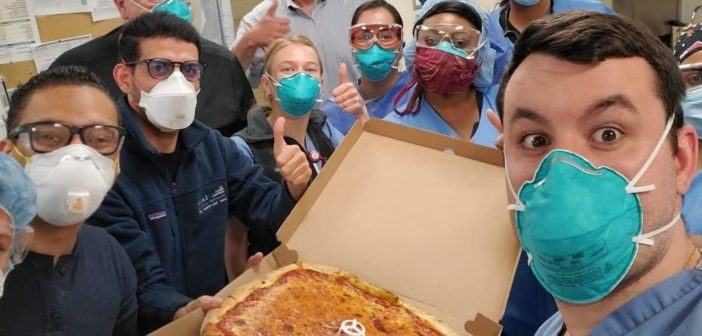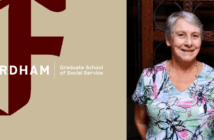
Photo courtesy of BX Pints and Pavements
If you attend a Fordham GSS Accepted Students Day, you’ll see Stephen McGowan, GSS ’14, in his element. An organizational tour de force, McGowan—an associate director of admissions at GSS—plans this event with the efficiency and care of an Apple iPhone launch.
However, his passion for community doesn’t stop at campus activities. McGowan’s home has always been the Bronx, and as the COVID-19 crisis struck, he couldn’t stand by and watch the borough be swallowed by sorrow. He needed to do something. So, with the assistance of his weekly running group, BX Pints & Pavements (BXP), McGowan looked for ways to help.
His answer: #FeedingFrontLiners.
Keeping Connection Through COVID-19
McGowan founded BX Pints & Pavements in April of 2019. What started as local bar friends trying to get healthier became a bonding experience, and the group has since grown to about 50 members. For the past year, you could find them running every Tuesday.
“We’d run three miles or a 5k, and we’d hang out [afterward]and build community,” McGowan said. “For me, that was the more important part of it. The running was a means to pull people in, but really just providing another space for community building in the Bronx was really important to me.”
When COVID-19 forced New York City into quarantine in March of this year, BXP had no choice but to stay home. It’s hard to run six feet apart as a group of 50, and there would certainly be no happy hour afterward. McGowan and his crew captains had to think of ways to keep members and the community engaged. Along with fellow Bronx running groups, BXP went digital: virtual runs, app-tracking run distances, and posting on social media.
Meanwhile, the devastation continued. By mid-April, the U.S. COVID-19 death toll surpassed 30,000.
McGowan watched his city shut down. Businesses closed; streets emptied—the community was silenced. Online workouts may have sufficed for his society of 50, but what about his home?
“We wanted to support our frontline workers, as well as support local businesses,” McGowan said. “We wanted to provide support in some way.”
It began with pizza.
#FeedingFrontLiners
One of the members of BXP works for Lincoln Hospital in the Bronx. When McGowan heard public hospitals like Lincoln can’t provide free food to their residents, he worked with his team on a delivery plan. After discovering the #FeedingFrontLiners movement—a popular, social media driven crusade of bringing meals to front line workers—McGowan knew this was a chance to not only engage his running group, but also help his home heal.
So, he organized a drop off. Members of the running crew would chip in for pizza from a local shop and deliver pies to the hospital. Before McGowan knew it, this became a weekly event. BXP delivered pizza, stocked the hospital’s snack room, and brought locally-made cupcakes to a nurse’s station. But McGowan’s favorite? Homemade cards written by his team.

Photo courtesy of BX Pints and Pavements
“We did thank you cards and sent them down to the staff that was working directly with COVID-19 patients,” he said. “Some got their kids to do it, so there were all these types of photos and everything. We got a list of all the names of the workers so everybody was able to really personalize the message. It’s something they can hold onto.”
And it didn’t stop there. Although grateful for the sacrifice hospital residents make, McGowan knows they aren’t the only ones working the front lines. BXP has also delivered food to a Bronx EMS station, and a Walgreens in the Riverdale area—connections made possible by fellow crew members.
“It’s nice because people are looking for ways to get involved, and sometimes an outlet just needs to be provided,” he said. “Every week people are donating money or their time, and it’s been pretty amazing to see that happen.”
Involvement with Social Work
McGowan received his Master of Social Work (M.S.W.) degree in 2014. It has since allowed him to combine his natural drive toward relationships and interest in policies to help students find their own paths. When people ask him why he didn’t “get into social work,” he replies that he did.

Photo courtesy of BX Pints and Pavements
“My honest response is, I am doing social work,” he said, “by working with prospective students and talking with them about the profession. It’s about helping them understand they have the potential to be as successful as they want to be in this career, and make the kind of change that’s going to be meaningful for them.”
McGowan said getting an M.S.W. heightened his instinctual ability to connect with people and know what they need. Now, he uses that wealth of knowledge both with students, and the members of BXP.
“Being able to see the strengths in people, even when they’re struggling or having a hard time seeing what their strengths are, and being able to focus on that and bring them into the fold that way has been helpful with the formation of this group,” he said. “Then, kind of shifting our focus while we’re in this crisis to be a support for others and each other.”
How to Help Your Community
COVID-19 doesn’t discriminate. We have all, in some shape or form, been affected by the virus and the hurt it brings. As of May 28, 2020, COVID-19 has killed over 100,000 people in the United States.
However, if there is one silver lining from this tragedy, it’s the display of altruism by those around us. People want to help one another.
For those who want to support but don’t know where to start, McGowan suggests going to your local community center. Find a food bank nearby and donate what you can. Sign up for a hotline for older adults isolated from their families. Visit the National Association of Social Workers website and see what new policies are being advocated. Make your voice heard.
“If you don’t have the money but you have the time, then there’s a way to contribute. If you don’t have the time but have the money, there’s way to contribute. If you don’t have the time or the money, you can write an email—you can write a thank you card,” he said. “Sometimes it’s just when you’re in the grocery store, and you see someone behind the counter and they’re putting themselves at risk, just saying thank you. Those go a lot further than people realize.”



